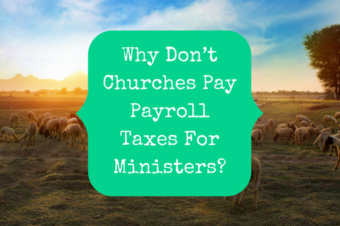Last week we discussed the value of an accountable reimbursement plan for churches now that pastors can no longer deduct their unreimbursed business expenses. Today, I will tell you how to actually set one up.
What Makes A Reimbursement Plan Accountable
The confusing thing about accountable plans is that you don’t need to file any forms or get any kind of permission from the IRS. We’re used to needing authorization for things, like Form 4361, so we get nervous when we don’t have the IRS’s official stamp of approval. However, you don’t have to communicate with the IRS about an accountable plan, you just have to follow their rules.
What makes a reimbursement system an accountable plan is that it complies with these three IRS rules:
Expenses Must Be Ministry-Related
The expense that you’re seeking to be reimbursed for must have been incurred while performing services as an employee of your employer (the church). I’m calling them ministry expenses here because that’s what they are for pastors and churches, but the IRS calls them business expenses. For our purposes, the words business and ministry are interchangeable.
Basically, any expense that was previously deductible is allowed under an accountable plan. Examples of qualifying expenses are:
- Ministry use of an automobile: IRS standard mileage rate and parking fees and tolls (miles between the church and home do not count)
- Convention, conference, seminar, and workshop expenses
- Ministry travel: lodging, transportation, and meals on overnight trips (receipts are not required for most travel expenses under $75, not including lodging)
- Continuing education expenses (if it does not qualify you for a new position)
- Sermon resources and educational material, if church-related
- Subscriptions, books, internet, and software, if ministry or work-related
- Office supplies and church gifts
- Ministry-related legal and professional services
- Equipment such as computers. Cell phones are only reimbursable for the portion of their use that is ministry-related and require a detailed accounting of ministry versus personal use.
- Hospitality and entertainment when church-related. Reimbursements can cover the entire cost of meals.
If the church reimburses an employee for expenses that are not ministry-related, then they must be reported in the employee’s wages for income tax purposes and are not deductible.
Expenses Must Be Accounted For In A Timely Manner
Accounting for your expenses means that you have to keep a record of them along with proof like a receipt. It works the same way as if you were deducting them on your personal tax return. You can use a church-provided form, diary, account book, log, statement of expense, or another similar record to document each or your expenses when they occur (or shortly thereafter). Your records should show:
- Date
- Place
- Description of expense
- Ministry purpose
- Names or ministry relationship of people involved
- Dollar amount
In addition to keeping adequate records, they must be submitted to your church in a timely manner. “Timely” is a very subjective word and open to interpretation. The IRS acknowledges that “a reasonable period of time” can vary depending on the facts and circumstances of your situation. However, to be safe, they recommend giving advances within 30 days of the expense incurring and accounting for expenses no more than 60 days after incurred.
Excess Reimbursements Must Be Returned In A Timely Manner
Any advances that are not completely used on qualified expenses or adequately accounted for within a reasonable period of time must be returned to the church. If they are not returned, they will count as taxable income for you.
Again, the IRS offers guidelines for what they consider to be a reasonable period of time. Excess reimbursements must be returned within 120 days after the expense was paid or incurred. Another option is for the church to issue quarterly statements asking employees to return or adequately account for outstanding advances. In those cases, the employee has 120 days after receipt of the statement in which to comply.
How Reimbursements Under An Accountable Plan Are Reported To The IRS And Taxed
Under an accountable plan, reimbursements come out of the church’s funds and not the employee’s salary. The reimbursements are not reported to the IRS as taxable income on Form W-2. And the employee does not need to report them to the IRS either. If the church mistakenly includes them on Form W-2, they should issue a corrected form as soon as possible.
Reimbursements that do not qualify based on the above rules because they are not ministry-related or were not substantiated in a timely manner do qualify as taxable income. These amounts are included in wages on an employee’s Form W-2 and subject to income and payroll taxes.
How To Establish An Accountable Plan
As I mentioned above, there are no specific IRS forms that you need to fill out or get approved to establish an accountable reimbursement plan. Your church simply has to make an official decision that they are going to have one. It doesn’t even require a church vote or anything like that. As long as the church has given their finance committee or executive staff power over budgeted funds, then they can decide to establish an accountable plan and the IRS is okay with it.
Just say the word and you have an accountable plan. Of course, you need to train your employees on how to follow the plan correctly. If they don’t do it right, they will receive no benefit from it. Also, if the committee or staff overseeing the plan wants to place additional requirements on it beyond what the IRS lays out, that is their prerogative. And remember, the accountable plan is open to all employees of the church and not just the pastor or leadership.
I hope you find this article helpful. If you need more detailed information about things like per diem travel reimbursement or other specific situations, you can find it on this IRS web page.


















